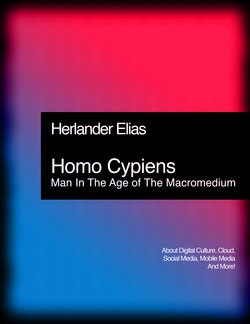Читать книгу Homo Cypiens - Herlander Elias - Страница 5
На сайте Литреса книга снята с продажи.
2. The Equivalence Images
ОглавлениеOne of the problems of the massive media objects we are confronted with is the fact that many images accumulate. With the expansion of mobile media such as smartphones, phablets and tablets, we multiply the capture of images at a level such that it is impossible for the subject to be able to deal with the images that he produces. And when we travel we photograph images from the same pedestrian angle, we are in the same places where all the tourists were before us. It seems that everyone is recording the same images and the same experiences. There is nothing new already. The novelty is gone when everyone is in the same place, does the same, sees the same and finally says “me too!”.
Massiveness is frightening as it produces images of equivalence, states of comparison, identical images, brand bodies, pop lifestyles. There is a “sameness” in everything that we encounter online. According to a social network like Facebook all the guys are doing the same. The main idea should lay on the use of the social network to promote events in the real world, and not just to be online searching items to later go where everybody goes. The world already has too many images, and we must not forget that the past is great, if not immense. We need to think about the future. Massive dynamics should somehow prepare us for the future, and in practice it is holding us back because access to knowledge, information and products and services is such that it is overwhelming us. Help us, we are in an overload of information!
There is less time, less space, but media objects have multiplied displaying a certain degree of toxicity in everything that the media prepares. There is also a lack of time to digest the massive dynamics that could catapult us. We are stuck into brands, services, bureaucratic procedures, gadgets, in conclusion, a total mess on the web. We urgently need to rethink our active role on the Internet, as this Internet is massive and dynamic and can not become a sickly collection of mental waste that takes over much of the population. The medium of globality, the medium of massive dynamics is indeed the Internet, and this environment changes the world in general ever since it emerged. Now it is smarter, and uncontrolled in part, but in another way over-controlled. From this observation we have no doubt that one can no longer live without this cyber-world because digital reigns with its circuits, its networks and its pulsating traffic. We are in the age of the network, in the pure age of the network. Everything that exists has a network parallel, an avatar, a representation, an icon, a partner simulation, or an accompanying application. The reality lived individually with its sorrows, joys and solitude is in the process of extinction. What has existed and what exists will always be on the Internet or in the cloud, if you prefer. And who deals with this phenomenon it is us, supposedly prepared for it, we homo cypiens.
One may say that we are in confrontation with the flow media, such as radio, MTV, generalist TV, and social media flow like Facebook and Instagram. There is a certain addiction to this system in which publications and images move massively within the reach of our fingers. This profusion of images seems to generate more information because when we search something more and more recent information comes to light. The massive dynamics has no end. It almost generates itself and manages itself. We are dealing with a mean of means, a macro-medium. The Internet has reinvented itself with some impetuosity and, thus, we are left to enjoy the services we pay because at this stage of the Internet everything is paid. We can have access to everything, but everything comes at a price. Flowing images as well as all flowing information is like an addictive game. This constant flow becomes dynamic, not ceasing to be massive since there is a serious problem of accumulation of images. Too many images compromise memories and experiences. We see and consult so much of other people that we no longer perceive what is really ours. The semi-public space of the Internet has contaminated all the moments of work, leisure and entertainment. Massive dynamics is a monster to tame.
Fascinated by the access to everything we are becoming impassive or curious about the publications and shares of everything that appears in the Internet. Our experience and memory captures those of others. It is difficult, with the passage of time, to actually understand what is really ours and what is not, having the concept of “property” changed with the Internet. What is mine and what is ours are two identical things, which has generated an authorial crisis in our time when massive dynamics collides with continuous recording ― these are very complicated times for authors and creatives because what they produce or create is diluted, the Internet does not enjoy copyright or the right to a permanent place for future memory. For anyone who wants to access the Internet, there is always somewhere a copy of the world, a fac simile, a world-mirror, a carbon copy zone, a parallel world to the real one, and of course a continuous recording.
